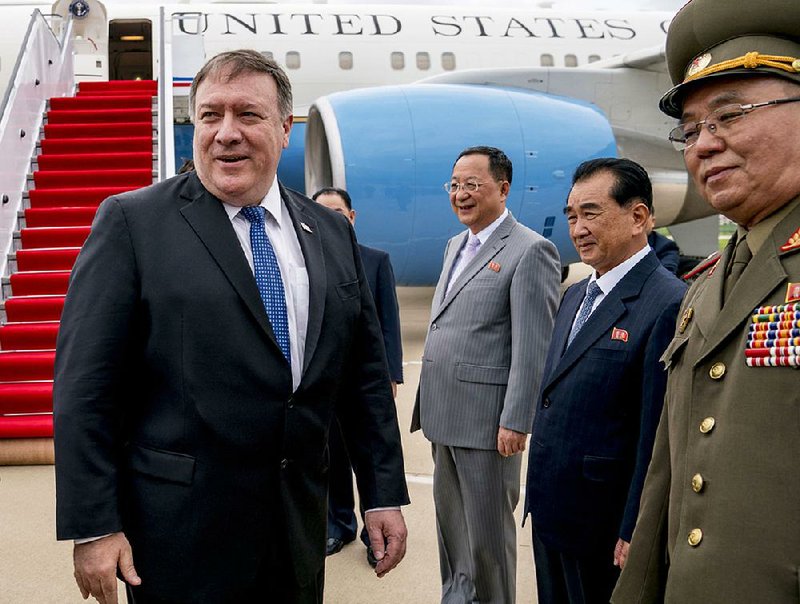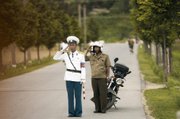PYONGYANG, North Korea -- Secretary of State Mike Pompeo opened a second day of talks today in North Korea aimed at persuading the country to give up its nuclear and ballistic missile programs.
Heading into the morning meeting, Pompeo as well as the head of the North Korean delegation, Kim Yong Chol, said there were issues after the June 12 summit in Singapore that needed to be made clear. "There are things that I have to clarify, as well," Pompeo said.
Ahead of the first day of talks, Pompeo told at least two outside experts that he's concerned his task was doomed from the outset.
The dire assessment from Pompeo comes despite that fact that he is one of the most visible proponents of North Korea talks in President Donald Trump's administration.
Pompeo has the crucial task of dispelling growing skepticism over how serious North Korean leader Kim Jong Un is about giving up his nuclear arsenal and translating the upbeat rhetoric after Kim's summit with Trump into concrete action.
It's his third trip to the North Korean capital in as many months, and his first since the summit. At the top of Friday's meeting with Kim Yong Chol, Pompeo quipped about his frequent visits.
"I was joking that if I come one more time, I will have to pay taxes here," the top U.S. diplomat.
Kim, who has been something of a point man on Washington negotiations for Kim Jong Un, said: "The more you come, more trust we can build between one another."
Their talks Friday lasted 2 hours and 45 minutes. They were held at a state guesthouse complex, a short drive from the mausoleum where North Korea's founding leader Kim Il Sung and his successor Kim Jong Il lie in state.
Heather Nauert, a spokeswoman for the State Department, said today that the two had agreed to create working groups to hash out details and had discussed the return of remains of U.S. service members missing since the 1950-53 Korean War.
It was not clear whether Pompeo would be meeting directly with Kim Jong Un, as he had done on his previous visits.
On the flight to Pyongyang, Pompeo said both sides made commitments at the Singapore summit on the complete denuclearization of North Korea and on what a transformed relationship between their two countries might look like.
"On this trip, I'm seeking to fill in some details on these commitments and continue the momentum toward implementation of what the two leaders promised each other and the world. I expect that the DPRK is ready to do the same," Pompeo said, using the initials for North Korea's official name.
Pompeo was expected to speak with Trump from Pyongyang early today. The secretary of state laughed when a reporter asked him to confirm a South Korean media report that he was taking a CD of the Elton John song "Rocket Man" to Kim. The gift, reported by the Chosun Ilbo newspaper, was an apparent effort to make light of Trump's remark in a United Nations General Assembly speech last year that "rocket man is on a suicide mission for himself and his regime."
U.S. STRATEGY
Pompeo has repeatedly said he believes that Kim is serious about negotiations.
But if the ultimate goal of North Korean denuclearization seems like a long shot, Pompeo's proximate goal, according to one senior administration official, is at least to get North Korean officials to reveal their true intentions fairly quickly. Previous U.S. administrations spent years in detailed and ultimately fruitless negotiations, giving the North breathing space to develop its lethal arsenal further.
If failure is inevitable, Pompeo wants it to come more quickly this time, so the administration can return to its maximum pressure campaign of sanctions and diplomatic isolation of North Korea, he has told advisers.
If the administration decides to return to a campaign of maximum pressure, officials have privately acknowledged, it may not again be able to persuade the world that Kim is out of control and cannot be trusted with nuclear weapons.
That was last year's tactic, when Trump branded Kim a "madman" and a murderer of his own people. Pompeo also then questioned whether Kim was rational and said, "I am hopeful we will find a way to separate that regime from" its nuclear arsenal.
In recent months, however, Trump has redeemed Kim, calling him "very honorable" and "nice" while insisting that the North is "no longer a nuclear threat." And Pompeo has repeatedly said in recent months that Kim is rational.
"After this meeting, Pompeo will probably again say that Kim Jong Un is intelligent and trustworthy, which is truly unfortunate," said Sung-Yoon Lee of the Fletcher School of Law and Diplomacy at Tufts University. "I think we're headed in the direction of giving up and accepting North Korea as a de facto nuclear state."
Nauert denied that Pompeo saw negotiations with the North as bound to fail.
"Will this be tough? Yes," she said of the expected many rounds of talks. "Will negotiations involve a lot of hard work? Of course. But the secretary is committed to implementing the plan agreed to by both leaders in Singapore."
Defenders of the Trump administration's strategy note that at least the North has ended its missile and nuclear tests.
But in the meantime, North Korea could continue perfecting its weapons systems. And countries that have perfected their weapons technology, as Kim has said the North has done, rarely need such tests.
Pakistan, for instance, has not carried out a nuclear weapons test for 20 years but is widely acknowledged to be a major nuclear power.
Michael Green, who negotiated with North Korea during the administration of President George W. Bush, agreed that the Trump administration would soon be forced to accept North Korea as a nuclear state.
"If the North Koreans don't fire off missiles or nuclear weapons but instead just don't comply with denuclearization, the administration is going to have a very hard time, having sold the Trump-Kim relationship the way they did, going back to China and the allies and saying in effect, 'We were duped,'" Green said.
N. KOREA'S INTENTIONS
What position the North will take on the nuclear issue appears to be anything but a done deal.
Doubts over the North's intentions have grown amid reports it is continuing to expand facilities related to its nuclear and missile programs and that U.S. intelligence is skeptical about its intentions to give up its weapons.
Meanwhile, Trump has said North Korea no longer poses a nuclear threat, and on Thursday he claimed credit for preventing war on the Korean Peninsula.
"When I took office and under the [President Barack] Obama administration, North Korea was doing tremendous testing, tremendous missile launches, and you can ask President Obama -- he was very close to going to war," Trump told reporters. "I don't think enough credit's given to the fact that under the Obama administration it was a mess. There was no talk -- it was only nuclear testing and rocket launches. And we haven't had that for eight months."
Speaking aboard Air Force One on a trip to Montana, Trump said he still believes Kim will follow through and said he forged a personal connection with the young autocrat.
"I think we understand each other. I really believe that he sees a different future for North Korea," Trump told reporters. "I hope that's true. If it's not true, then we go back to the other way, but I don't think that's going to be necessary."
Since Kim took power in 2011, he has launched more than 85 missiles and conducted four nuclear weapons tests. Under Trump's tenure, there have been nine missile launches, at least two involving intercontinental ballistic missiles, a major breakthrough, and North Korea's largest nuclear weapons test.
A pause in North Korean launches and testing was also achieved during the Obama administration for more than a year while Pyongyang promised the denuclearization of the Korean Peninsula, an outcome it never delivered on.
Trump needs Pompeo to score some points to lay to rest doubts over whether the president, who has already ordered a suspension of large-scale U.S. military drills with South Korea, is hurting the bigger goal of complete denuclearization by being overeager to claim a quick success.
What exactly Washington has in mind, however, isn't entirely clear.
National security adviser John Bolton, who has expressed hard-line views on North Korea, said last weekend that Pompeo will present Pyongyang with a plan to complete the dismantling of the North's nuclear and missile programs in one year.
On Tuesday, Nauert walked that back, declining to give a timeline.
Pyongyang is Pompeo's first stop on his first around-the-world trip as America's top diplomat. He will then travel to Japan, Vietnam and the United Arab Emirates before heading to Belgium, where he will accompany Trump at the NATO summit in Brussels.
[NUCLEAR NORTH KOREA: Maps, data on country’s nuclear program]
Information for this article was contributed by Andrew Harnik, Eric Talmadge and Kim Tong-Hyung of The Associated Press; by Gardiner Harris of The New York Times; by Nick Wadhams, Mehr Nadeem and Kanga Kong of Bloomberg News; and by John Hudson, Dan Lamothe, Karen DeYoung and Anne Gearan of The Washington Post.
A Section on 07/07/2018


